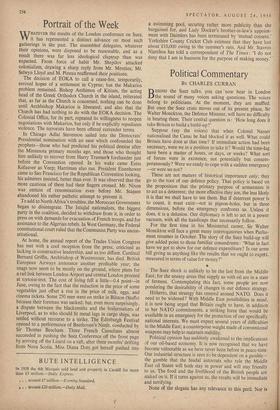Portrait of' the Week
WHATEVER the results of the London conference on Suez, it has represented a distinct advance on most such gatherings in the past. The assembled delegates, whatever their opinions, were disposed to be reasonable, and as a result there was far less ideological claptrap than was expected. From force of habit Mr. Shepilov attacked colonialism, drawing a sharp reply from Mr. Menzies; Mr. Selwyn Lloyd and M. Pineau reaffirmed their positions.
The decision of EOKA to call a cease-fire, temporarily, revived hopes of a settlement in Cyprus; but the Makarios problem remained. Bishop Anthimos of Kitium, the acting head of the Greek Orthodox Church in the island, reiterated that, as far as the Church is concerned, nothing can be done until Archbishop Makarios is liberated; and also that the Church has had nothing to do with the EOKA decision. The Colonial Office, for its part, repeated its willingness to reopen negotiations with Makarios, but only if he explicitly repudiates violence. The terrorists have been offered surrender terms.
In Chicago Adlai Stevenson sailed into the Democrats' Presidential nomination with an ease which confounded the prophets—those who had predicted his political demise after the Minnesota primary months ago, and those who thought him unlikely to recover from Harry Trumanki forehander just before the Convention opened. In his wake came Estes Kefauver as Veep; Harriman also ran. President Eisenhower came to San Francisco for the Republican Convention looking, his admirers insisted, better than ever. It was observed that the more cautious of them had their fingers crossed. Mr. Nixon was certain of renomination even before Mr. Stassen abandoned his rather pathetic attempt to prevent it.
To add to North Africa's troubles, the Moroccan Government began to disintegrate. The Istiqlal nationalists, the biggest party in the coalition, decided to withdraw from it, in order to press on with demands for evacuation of French troops, and for assistance to the Algerian rebels. In West Germany, the Federal constitutional court ruled that the Communist Party was uncon- stitutional.
At home, the annual report of the Trades Union Congress has met with a cool reception from the press; criticised as lacking in constructive leadership. and as too diffuse. Cardinal Bernard Griffin, Archbishop of Westminster, has died. British European Airways announce another profitable year; the snags now seem to be mostly on the ground, where plans for a rail link between London Airport and central London proceed at tortoise-trot. The cost of living fell a little-0.4 point—in June, owing to the fact that the reduction in the price of some vegetables just offset a rise in the price of milk, eggs, and cinema tickets. Some 250 men went on strike in Bilston (Staffs) because their foreman was sacked; but, even more surprisingly, a dispute between the blacksmiths and the boilermakers of Liverpool, as to who should fit metal lugs in cargo ships, was settled without recourse to a strike. The Edinburgh Festival opened to a performance of Beethoven's Ninth, conducted by. Sir Thomas Beecham. Three French Canadians almost succeeded in pushing the Suez Conference off the front page by arriving off the Lizard on a raft, after three months' drifting from Nova Scotia. Miss Diana Dors got herself pushed into a swimming pool, securing rather more publicity than she bargained for, and Lady Docker's brother-in-law's appoint- ment with Daimlers has been terminated by 'mutual consent.' Yorkshire County Cricket Club estimate that they have lost about £10,000 owing to the summer's rain. And Mr. Stavros Niarchos has told a correspondent of The Times: 'I do not deny that 1 am in business for the purpose of making money.'


























 Previous page
Previous page